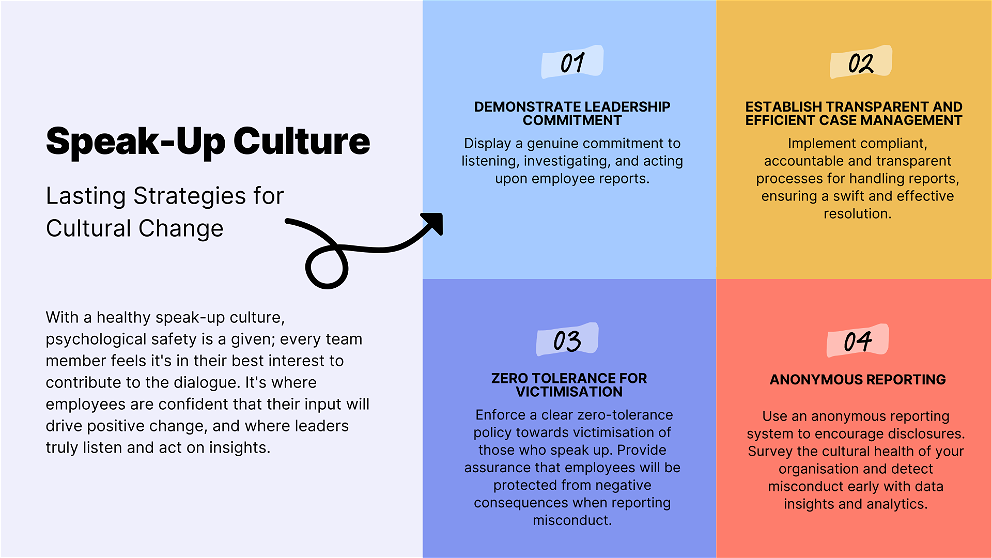Speak-Up Culture: Lasting Strategies for Cultural Change

What is a Speak-Up Culture?
A speak-up culture is an environment where employees are empowered to share ideas and concerns in a safe way. It's a culture that values every voice, where disagreements and mistakes are seen as opportunities for growth rather than reasons for punishment.
With a healthy speak-up culture, psychological safety is a given; every team member feels it's in their best interest to contribute to the dialogue. It's where employees are confident that their input will drive positive change and where leaders truly listen and act on insights. Organisations that produce such a culture stand out in their ability to navigate challenges, capitalise on opportunities, and outperform their competition.
Transforming workplace culture
In the wake of the Royal Commission into misconduct in the banking sector and allegations that ANZ Bank had silenced women who reported sexual harassment, Shayne Elliott stepped in as CEO to spearhead a transformative culture shift. Committed to rebuilding ANZ's workplace culture from the ground up, Elliott's leadership marked a new chapter for the organisation. In his words:
“The real impact you have is around you is the culture you develop, because culture is quite difficult to change, it is quite difficult to unwind.”[1] “For both age and sex-based discrimination in the workplace, one of the key ways to stop a behaviour in its tracks is to foster a strong speak-up culture – something we are proud to have at ANZ.” [2]
From a period marred by scandal to the top of the Financial Review's Best Places to Work awards in 2021 and 2022, the success of ANZ's transformation has been encouraging for many Australian organisations demanding a positive change in their workplace culture.
Since a 2018 human rights survey uncovered the prevalence of sexual harassment in the workplace, we've seen a number of high-profile cases in the news, a National Inquiry and a series of legislative changes come into effect. The Respect at Work Bill is one of the latest workplace reforms that reflect the right of all Australians to a safe workplace. Organisations now have a duty to eliminate sexual harassment and sex-based discrimination. In order to drive proactive change, a speak-up culture is no longer an option but a necessity in many workplaces. Organisations are increasingly turning toward strategies of transparency and accountability, driven by internal demand, activism and government policies, to foster an ethical work environment.
Building psychological safety
Workplace errors can be critical and costly. A safety oversight on a building site or an investment miscalculation can cause major financial and reputational damage. Likewise, a culture of harassment and discrimination that goes unnoticed can mean a loss of talent and innovation. When leading teams towards excellence, it's good to encourage accountability in individual successes. However, it's also important to provide a supportive space for employees to report mistakes and misconduct without fear.
Many organisations call this a "positive error culture"—an acceptance that errors are normal and can be resolved openly, reflected upon, and used as a chance to learn.
When people believe it's not in their best interest to speak up, teams have fewer opportunities to grow. But what are the typical barriers stopping people from speaking up? Some of these reasons include:
- Fear of retaliation: Concerns about being punished or victimised for reporting errors or misconduct.
- Lack of transparency and accountability: Doubts that reporting an issue will lead to meaningful action or change.
- Perception of incompetence: Worry that admitting a lack of knowledge or asking questions will be viewed as ignorance or incompetence.
- Lack of awareness or communication: Uncertainty in workplace policies and procedures.
- Trivialisation of concerns: The belief that the issue isn't severe enough and that speaking up might be seen as overreacting.
- Additional workload concerns: The belief that voicing a concern will result in extra duties or team tensions – it's "easier to keep quiet".
Unfortunately, for many employees anxious to make a disclosure, their reasons are justified. In the Time for Respect National Survey, the Australian Human Rights Commission found that employees who reported workplace sexual harassment often experienced negative consequences, including being ostracised, victimised or ignored by colleagues (13%) or being labelled a troublemaker (12%). The major hurdles are preventing retaliation from those who speak out against misconduct and establishing greater trust between our colleagues.
The benefits of a speak-up culture
There are plenty of sound reasons to cultivate a speak-up culture and mitigate risks across your business.
Improved job satisfaction and employee wellbeing
When employees feel listened to, and their feedback is acted upon, it can encourage a sense of ownership and pride in their work. Not only is this a powerful motivator, but it also fosters an engaged workforce more deeply invested in the company's success. Such investment often translates into a stronger alignment with company goals and values, alongside a readiness to contribute above and beyond the call of duty.
Increased innovation
Encouraging team members to voice their ideas and concerns cultivates an innovative and collaborative atmosphere. Employees who feel confident among their peers and feel their contributions are appreciated are more likely to offer fresh solutions, share insights, or suggest creative product developments. This proactive involvement can lead to remarkable strides in company performance and a thriving workplace culture.
Attract and retain quality employees
In a competitive job market, prospective employees frequently turn to employer review websites, such as Glassdoor, to scrutinise the reputation of potential employers. People are drawn toward companies that are reputed for their supportive culture and emphasis on employee well-being. Such environments are not only attractive but also ensure that once employees are onboard, they remain at the company. The financial importance of employee retention is often overlooked. Turnover is costly, and comparatively, a stable, experienced workforce drives a company forward.
Fewer fines and lawsuits
A speak-up culture can significantly reduce an organisation’s legal risks. A recent study on the efficacy of whistleblowing systems showed that a 10% increase in whistleblower reports is associated with a significant decrease in government fines and legal settlement amounts.
By increasing the number of issues uncovered, companies can avoid the negative consequences of litigation, protecting their reputation and bottom line. This proactive approach allows for the resolution of conflicts and misunderstandings in their infancy, sparing the organisation financial penalties and regulatory fines. Moreover, companies demonstrate their commitment to ethical practices and corporate responsibility, which enhances their image in the eyes of the public, customers and investors.
Identify threats before they escalate
An environment that encourages reporting can help catch small problems before they become significant threats, ensuring a safer and more secure workplace for all. By fostering a proactive approach to identifying and addressing risks, employees become the first line of defence against potential threats. This not only applies to the physical and psychological safety of employees but also to the integrity of data and the protection of company assets. Encouraging a vigilant and responsive workforce can be the key to preventing major incidents that might otherwise go unnoticed.
Strategies for fostering a healthy speak-up culture
Clear policies
Transparent, well-documented, and consistently enforced company policies underpin trust and understanding within an ethical organization. The same rules apply to management as much as employees. Everyone should be aware of:
- how to report issues, and what tools are available to report anonymously.
- the types of behaviour that constitute serious misconduct and the consequences of such behaviour.
- the company policy towards retaliation.
- the responsibilities of a bystander in reporting incidents of misconduct.
Zero tolerance towards victimisation
Ensuring zero tolerance towards victimisation is essential to protect employees from the consequences of raising concerns and making reports of misconduct. Organisations must communicate their non-retaliation policies clearly and consistently.
Anonymous reporting and employee feedback
Confidential reporting channels are indispensable for employees who might hesitate to voice their concerns for fear of retaliation. By providing secure platforms for reporting issues, organisations can ensure that employees feel safe reporting concerns without disclosing their identity or position. Even with a culture of openness and consistent enforcement of company policies, there are sensitive issues that employees may still be reluctant to report. Modern workplace reporting tools offer a wealth of features that help employees feel comfortable speaking up about misconduct, such as:
- The ability to report anonymously as a group or individual.
- Providing documentation and evidence without disclosing their identity.
- Choosing a secure reporting pathway (who they report to and who sees the report).
- Tracking the case status and outcome.
- Providing follow-up evaluation of the outcome and reporting procedure.
Efficient case management
When employees are assured that their reports will trigger meaningful action, they’re more inclined to engage in raising concerns. Efficient case management, with dedicated human resources and transparent processes, reassures employees that their concerns are taken seriously and handled appropriately.
Person-centred and trauma-informed care
Supporting employees’ emotional well-being is fundamental in a speak-up culture. Providing person-centred and trauma-informed care, along with employee assistance programs, can significantly improve employees' feelings towards sharing sensitive information and making reports.
Training
Training is fundamental to a robust speak-up culture. Organisations can ensure that issues are addressed with care and professionalism by educating employees on the reporting systems and training case managers to handle issues effectively.
Rewarding courage
Recognising and rewarding employees who exhibit the courage to speak up about inappropriate behaviour sets a positive example and helps to encourage employees to do the same. Public recognition and peer-to-peer acknowledgment can create a cycle of engagement that reinforces the value of speaking up.
Learn from data - measuring success
Data is critical in gauging the success of a speak-up culture. By analysing reports and feedback, including insights from culture surveys, organisations can identify trends and areas for improvement, establishing a positive feedback loop that enables continuous refinement of policies and practices. This analysis helps in understanding the extent to which employees feel comfortable and secure in reporting issues and the effectiveness of the response mechanisms in place. It also provides valuable insights into the overall health of the organisational culture and employee morale. By regularly monitoring this data, leaders can make informed decisions to foster a more open and communicative workplace environment.
How Elker can help
A speak-up culture is not just a beneficial goal but a necessary strategy to eliminate sexual harassment and misconduct in the workplace. Implementing the strategies discussed here can lead to the cultivation of an environment that values and draws strength from the varied perspectives of its workforce. The path to developing a speak-up culture is continuous and demands commitment; however, the outcomes—increased trust, innovation, and organisational performance—are significant and impactful.
Elker contributes to the establishment of a strong speak-up culture by providing a secure and encrypted anonymous reporting platform. This platform enables employees to express their concerns with confidence, knowing their identity remains protected. The platform's user-friendly nature, combined with its capacity to integrate with professional legal services, renders it an essential tool for companies dedicated to upholding ethical standards and adhering to regulatory requirements.
Book a demonstration of the platform and discover how Elker can support your organisation's ongoing commitment to change.


